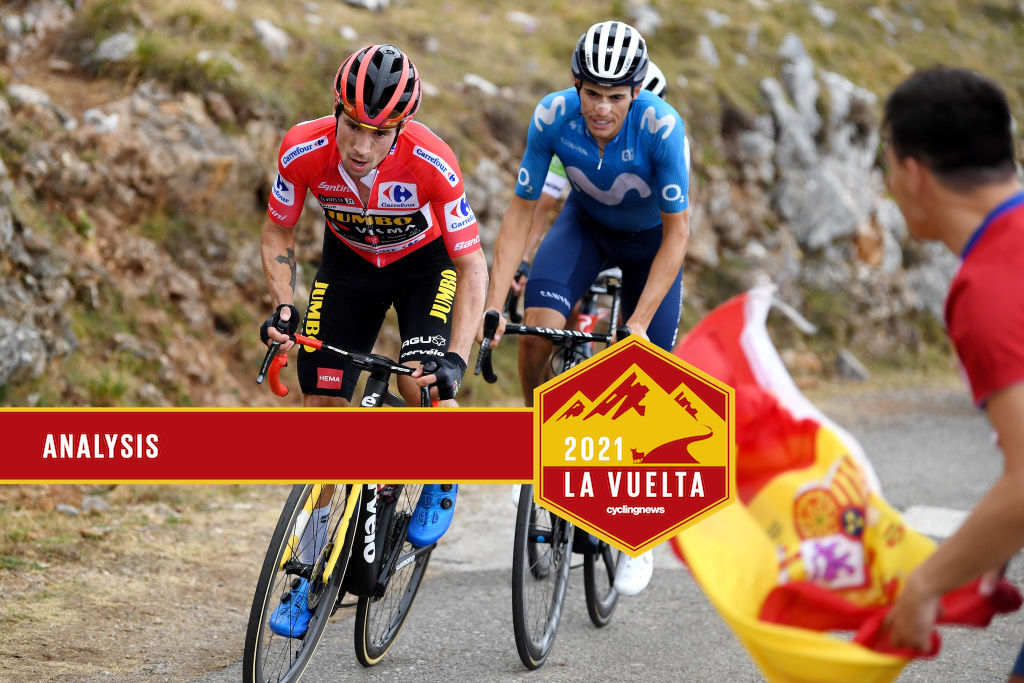Vuelta a España: All downhill from here? Primoz Roglic eyes third overall victory
Jumbo-Visma leader in command with three days remaining

During Miguel Ángel López's press conference as winner of stage 18 at the Vuelta a España, one of the most telling moments came when the Movistar co-leader was asked if he thought Primož Roglič (Jumbo-Visma) was still beatable.
López didn’t quite throw in the towel, there and then. But he almost did.
“The hardest part of the race is behind us, and there’s still a time trial ahead. It’s going to be complicated,” López said. At this point in the Vuelta game, that sounds like an understatement.
Put in terms of pure mathematics, after entering the two crucial mountain stages 1:36 behind the unexpected tenacious interim leader Odd Christian Eiking (Intermarché-Wanty-Gobert Matériaux) and with a 35-second advantage on López's teammate Enric Mas, Roglič is leaving Asturias firmly in red and with an advantage of 2:30 on Mas and 2:53 on Lopez. By anyone’s standards, that’s a huge step towards final victory for the defending champion.
Other scenarios had been put forward at this point in the game. It was repeatedly said that the Asturias mountains represented the best chance on offer for Mas and López, second and third overall, to try and put Roglič in difficulties. There was a partially established precedent that Roglič tends to have a tough time in the third week, although its exponents could have remembered that was far from true in the 2019 Vuelta a España.
But instead, Roglič has placed himself in a class of his own. Following Egan Bernal (Ineos Grenadiers) up the road with 60 kilometres to go on Wednesday culminated as one of the most spectacular chapters in the history of recent Vueltas.
It also acted as the springboard Roglič needed to go for broke at the Lagos de Covadonga, and in the process all but ensure a third Vuelta victory is in the bag. Taking second on Thursday’s second, harder mountain stage, almost felt like a formality after that particular performance.
Get The Leadout Newsletter
The latest race content, interviews, features, reviews and expert buying guides, direct to your inbox!
There are a couple of caveats on the idea that Roglič is automatically bound for glory in three days' time, and they’re not minor ones. Friday’s lengthy stage across northern Galicia has accurately been described as flatter by Bernal than the event's back-to-back Asturias mountain treks. It still contains over 3,000 metres of vertical climbing, however, and could become terrain for some sort of long-distance challenge.
Saturday’s stage, frequently compared to Liège-Bastogne-Liège but in Galicia, is even harder, and the constantly twisting, technical terrain could yet prove ideal ground for a last-minute GC ambush or upset.
Yet as things stand, and assuming none of that happens, if the Vuelta reaches the final time trial on Sunday, the chances are that the highest part of the GC ranking will see very few changes.
Quite apart from Roglič’s prospects of overall victory, as a notoriously poor time triallist, López's chances of overtaking Mas to claim second despite there only being a 23-second gap between the two are low. Equally, Jack Haig’s (Bahrain Victorious) options on overtaking López and get on the podium, with a gap of 1:43 between the fourth-placed rider and the Colombian, are relatively scant.
The last two road stages are hard enough, though, that their potential risks for Roglič and the rest of the GC favourites can’t be ruled out. Friday’s finale is not too tricky and the stage’s second half is far flatter than its opening segment, but Saturday has been deliberately designed to create surprises, and it may yet do so.
What is clear at this point in the game, is which rider is best positioned to win the Vuelta a España outright in three days time - and that’s the same rider who finished in red in 2019 and in 2020.
Alasdair Fotheringham has been reporting on cycling since 1991. He has covered every Tour de France since 1992 bar one, as well as numerous other bike races of all shapes and sizes, ranging from the Olympic Games in 2008 to the now sadly defunct Subida a Urkiola hill climb in Spain. As well as working for Cyclingnews, he has also written for The Independent, The Guardian, ProCycling, The Express and Reuters.
